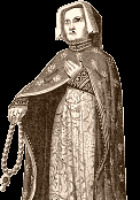Eustache Deschamps
Eustache Deschamps Poems
In Antwerp, Bruges, Ostend and Ghent
I used to order food with flair,
But in every inn to which I went
They always brought me, with my fare,
...
O Socratès plains de philosophie,
Seneque en meurs, Auglius en pratique,
Ovides grans en ta poëtrie,
...
You who live now in this world
And which live sovereign in virtue,
It is to you death remembered?
...
Fleas, stink, pigs, mold,
The gist of the Bohemian soul,
Bread and salted fish and cold.
...
Eustache Deschamps Biography
Eustache Deschamps was a medieval French poet, also known as Eustache Morel Biography Born at Vertus, in Champagne, he received lessons in versification from Guillaume de Machaut. After having finished his classical studies at the episcopal school of Reims, under the poet Guillaume de Marchault, who was a canon of Reims, he studied law at the University of Orléans. He then travelled for some time as the king's messenger in various parts of Europe, in Syria, Palestine, and Egypt; in the last country, it is said, he was made a slave. On his return to France he was appointed gentleman-usher by Charles V, and was confirmed in his position by Charles VI, whom he accompanied in that capacity on various campaigns in Flanders. In 1381 King Charles VI made him governor of the town of Fismes, and in 1388 bailiff of Senlis; at a later date he lost the position of bailiff, together with his pension and his office at court. Deschamps was a poet of no little merit. His numerous poems, ballads, rondels, lays, and virelays are full of valuable information concerning the political and moral history of his time. He was an honest, religious man, and although a courtier was also a moralist who did not hesitate to condemn the injustice and wrongs that he had seen and experienced. His style is somewhat heavy, but it is vigourous and not lacking in grace. Deschamps wrote as many as 1,175 ballades, and he is sometimes credited with inventing the form. All but one of his poems are short, and they are mostly satirical, attacking the English, whom he regards as the plunderers of his country, and against the wealthy oppressors of the poor. His one long poetic work, Le Miroir de Mariage, is a 13,000 line satirical poem on the subject of women. This work influenced Geoffrey Chaucer who used themes from the poem in his own work. Chaucer seems to be one of the few Englishmen Deschamps liked, as he composed a ballade in his honor praising Chaucer as a great philosopher, translator, ethicist, and poet.)
The Best Poem Of Eustache Deschamps
Ballade 2
In Antwerp, Bruges, Ostend and Ghent
I used to order food with flair,
But in every inn to which I went
They always brought me, with my fare,
With every roast and mutton dish,
With boar, with rabbit, pigeon, bustard,
With fresh and with salt-water fish,
Always, never asking, mustard.
I ordered herring, said I'd like
Carp for supper at the bar,
And called for simple boiled pike,
And two large sole, when I ate at Spa.
I ordered green sauce when in Brussels;
The waiter stared and looked disgusted;
The bus boy brought in with my mussels
As always, never asking, mustard.
I couldn't eat or drink without it.
They add it to the water they
Boil the fish in and-don't doubt it-
The drippings from the roast each day
Are tossed into a mustard vat
In which they're mixed, and then entrusted
To those who bring-they're trained at that-
Always, never asking, mustard.
Prince, it's clear a spice like clove
can drop its guard. It won't be busted.
There's just one thing these people serve:
Always, never asking, mustard.
